Introduction.
Three people were particularly involved, two women and one man, these were: Mildred Gillars, known as Axis Sally, Iva Toguri, aka Tokyo Rose, and William Joyce, who broadcast German propaganda over the radio, and was called Lord Haw Haw.
Mildred Gillars.
This woman was American who had lived in France, and by 1934 moved to Germany, becoming in due course, the Director of Radio Berlin. Mildred became known as Axis Sally, and broadcast propaganda for the German publicity machine from their radio stations. During the furious Battle of the Bulge, she was heard exhorting the US troops to give up fighting, as 50,000 of them had been captured by the German Army, needless to say, this ploy did not work. Her propaganda efforts failed, and after the war she was tried in American Courts for treason, and found guilty.
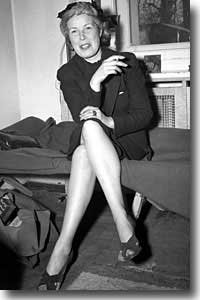
Mildred Gillars as Axis Sally broadcast for Nazi Germany in WW2
Iva Ikuko Togui.
The second woman in this category was Iva Togui, whose sultry voice was heard across the Pacific when she broadcast for the Japanese, and played music for US troops, who dubbed her Tokyo Rose. Iva had been born in the United States on the 4th. of July 1916 from Japanese parents in Los Angeles. At age 25, she set off for Japan on the 5th. of July in 1941, her Aunt there had become ill, and she went to represent her family.
As she left at short notice, there was insufficient time for the State Department to issue her with a Passport, in lieu, she carried a Certificate of Identification, which supposedly would be sufficient to allow her to return to the US in due course. She tried to return in November 1941, but was refused, as US authorities stated there was no evidence that Iva was in fact a US citizen.
When war was declared between the US and Japan on the 7th. of December 1941 after the infamous Japanese attack on Pearl Harbor, she was stranded in Japan. She tried to augment her income with some work in radio
doing typing, and eventually did some radio broadcasting. Her work could be classed as giving out Japanese propaganda, and also included playing popular music beamed at United States troops fighting in the Pacific theatre. She was to become known as Tokyo Rose.
Post war, Iva was arrested, tried in US courts for treason, and given a 10 year prison sentence, which she served for six years and two months at the Federal Reformatory for Women in Aderson West Virginia. At this same prison serving her sentence also for treason was Mildred Gillars. Eventually Iva was pardoned by President Ford, there is evidence that she tried to assist Allied Prisoners of War in Japan.
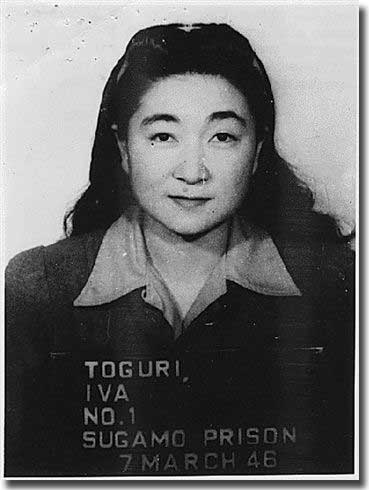
Iva Togui, Tokyo Rose
Obituary: American convicted as 'Tokyo Rose'
By Richard Goldstein The New York Times
Published: September 27, 2006
Iva Toguri D'Aquino, the Japanese-American convicted of treason in 1949 for broadcasting propaganda from Japan to United States servicemen during World War II as the seductive but sinister Tokyo Rose, died Tuesday 26th. of September in Chicago. She was 90.
Her death, at a Chicago hospital, was confirmed by a nephew, William Toguri, who said only that D'Aquino had died of natural causes, The Associated Press reported.
Tokyo Rose was a mythical figure. That persona, its origin murky, had been bestowed by U.S. servicemen collectively on a dozen or so women who broadcast for Radio Tokyo, telling soldiers, sailors and marines in the Pacific that their cause was lost and their sweethearts back home were betraying them.
But the identity of Tokyo Rose became attached to D'Aquino, a native of Southern California and the only woman broadcasting for Radio Tokyo known to be a U.S. citizen. She emerged as an infamous figure in a rare treason trial. Convicted by a federal jury in San Francisco on one of eight vaguely worded counts, she was sentenced to 10 years in prison and a $10,000 fine. She served six years and two months, then lived quietly in Chicago, running a family gift shop. On Jan. 19, 1977, she was pardoned, without comment, by President Gerald Ford on his last full day in office, restoring her citizenship.
"A mere wartime myth, Tokyo Rose was to become a disgrace to American justice," Edwin Reischauer, the U.S. ambassador to Japan from 1961 to 1966 and a scholar at Harvard specializing in East Asian affairs, wrote in his introduction to "Tokyo Rose: Orphan of the Pacific," by Masayo Duus.
Iva Ikuko Toguri was born in Los Angeles on July 4, 1916, a daughter of Japanese immigrants who owned a grocery store. She graduated from the University of California, Los Angeles, in 1940 with a degree in zoology, hoping to become a physician. In the summer of 1941, she visited an ailing aunt in Tokyo at the request of her mother. When the Japanese attacked Pearl Harbor, she was stranded in Tokyo, knowing virtually no Japanese, deprived of a food ration card by the authorities after refusing to become a Japanese citizen and hard-pressed to find work.
In 1942, she obtained a job with Japan's Domei news agency, monitoring U.S. military broadcasts, and late in 1943 she became an announcer and disc jockey for Radio Tokyo's propaganda broadcasts, playing American musical recordings on the "Zero Hour" program beamed to American servicemen. She called herself "Ann" or "Orphan Ann," short for announcer and a play on the Orphan Annie character.
While continuing to work for Radio Tokyo in 1945, she married Felipe D'Aquino, a Domei news agency employee with Portuguese citizenship but Japanese ancestry.
When the war ended, several American reporters learned of D'Aquino's broadcasts and interviewed her in Japan. She said she was Tokyo Rose, evidently presuming that no great notoriety would be attached to that and perhaps hoping to embellish an intriguing story for American readers, having been paid for her account in a magazine article. She subsequently denied ever having called herself Tokyo Rose in her broadcasts and no evidence was produced to the contrary.
As an outgrowth of the publicity, D'Aquino was arrested and questioned by U.S. military occupation authorities and the FBI.
In the autumn of 1946, D'Aquino was released from custody in Japan after the U.S. Army and the Justice Department concluded that there were no grounds for prosecuting her. But the Justice Department reopened the case in 1948.
D'Aquino, who had unsuccessfully sought permission from the U.S. authorities to return to California, was arrested on charges of treason, transported to San Francisco, held in a county jail for a year, then put on trial in 1949. When D'Aquino went on trial, five Americans had been convicted of treason for actions in the war, four having broadcast for Nazi Germany, most notably Millard Gillars, known as Axis Sally.
Testifying at the 12-week trial, D'Aquino denied she had ever made any disloyal statements on Radio Tokyo and she was supported in testimony from former Allied prisoners of war who had worked in the Japanese broadcasting operation.
D'Aquino was convicted on a single count of treason, relating to a broadcast she was alleged to have made to American servicemen in October 1944, referring to the loss of their ships.
After serving her sentence at the federal penitentiary for women in Alderson, West Virginia, D'Aquino fought government efforts to deport her. She ran an Asian grocery store and gift shop in Chicago. Her husband returned to Japan after her trial and she never saw him again.
William Joyce.
The third and final one of our WW2 radio propagandists was American born William Joyce, who was sympathetic to the Nazi cause. He held a British passport, and fled to Germany when war broke out in 1939. There he broadcast German propaganda on radio, taking the name of Lord Haw Haw, his radio sessions were listened to in England but really did not make any impact.
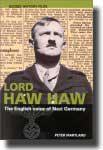
Lord Haw Haw, the English propagandist for Nazi Germany
In late 1940, when Midshipman serving in the Australian heavy cruiser HMAS Australia, we had just arrived in Liverpool to go into dock to repair damage to the ship sustained at the abortive Allied attack on Dakar in West Africa, which had been led by the Free French General, Charles de Gaulle.
Atop the well known dockside Liver Building sit two stone replicas of the Liver Bird, which is a mythical, but flightless bird.
That night in his radio broadcast from Berlin, Lord Haw Haw announced: "We are aware that HMAS Australia is docked in Liverpool. Tonight our bombers will make those Liver Birds fly!"
Over three consecutive nights in December, the city of Liverpool was subjected to some really intensive bombing raids, and William Joyce's boast was almost fulfilled, but not quite. Those two stone Liver Birds remained intact on their perch high up on top of the Liver Building, but they were certainly shaken.
Post war, Joyce was tried for treason, found guilty and hanged.
Thus these three Axis radio propagandists, all of whom were American born, and had worked for our enemy were tried, convicted, and paid a price.
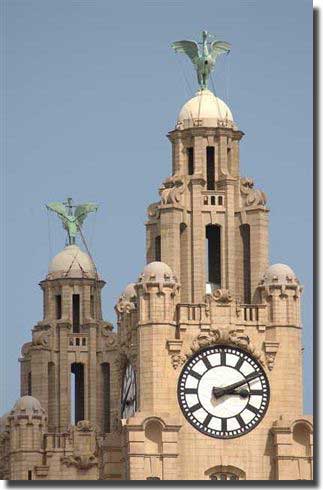
The Liver Building Liverpool
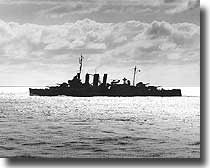
HMAS Australia, bombed in dry dock in Liverpool, England in December 1940





